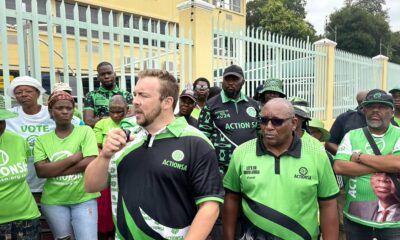News
Inside the Ghost Worker Scam Draining Billions from South Africa’s Government Payroll

The South African government, the country’s largest employer with more than 1.3 million public servants on its payroll, is battling a massive internal crisis: ghost workers—fictitious employees collecting real salaries—are quietly bleeding billions from the state’s budget.
These phantom paychecks aren’t the result of simple errors. According to the Department of Public Service and Administration (DPSA), what’s unfolding is a deliberate and deeply embedded act of fraud, orchestrated by criminal syndicates operating within the state’s own departments, agencies, and state-owned entities.
An Inside Job: How Ghost Workers Get Paid
To get a ghost worker into the system, a network of colluding insiders is required. The DPSA explained that capturing and approving someone on the government’s payroll system—Persal—involves multiple verification steps. Yet, the fact that thousands of fake employees have already been discovered points to systemic manipulation and collusion.
The process needs at least three staff members to cooperate—one to input the data, another to authorize it, and a manager to sign off on the final reports. This layered approval system, designed to prevent fraud, is failing because of compromised personnel, weak oversight, or shared login credentials.
Jan de Villiers, a Democratic Alliance MP and spokesperson on public service and administration, says the scale of the problem proves it’s not just poor administration—it’s a “medium for systemic corruption.”
“Ghost workers aren’t just names on paper—real people are drawing these salaries. It’s a massive theft of taxpayer money,” de Villiers said.
Audits and Accountability on the Horizon
Over the years, isolated payroll audits have helped uncover many of these ghost workers. But now, the DPSA and National Treasury are pushing for a far more comprehensive state-wide payroll audit. The DA wants to take it further, calling for an in-person verification of all public servants.
However, the DPSA has warned Parliament that such a full-scale audit would be expensive and resource-heavy. More importantly, it says even verification processes themselves are vulnerable to corruption.
Instead of simply adding more layers of approval, the DPSA is emphasizing professionalising the public service, promoting ethics, and strengthening internal accountability. Consequence management and collaboration with National Treasury remain key to identifying and rooting out the ghost workers still hiding in the system.
Auditor-General Involvement Urged
The DA is also calling on the Auditor-General to include payroll fraud in its annual audits of government departments, ensuring a more independent and robust layer of scrutiny.
“Until government can ensure the integrity of its payroll, billions in public funds will continue to disappear into the hands of fraudsters,” de Villiers warned.
What This Means for South Africans
For ordinary South Africans, this scandal represents more than lost money—it’s about trust. In a time when citizens are being asked to do more with less, watching tax funds enrich criminal networks inside government is a betrayal.
The government now faces a crucial test: will it take decisive action to clean up its payroll and rebuild trust in the public service, or allow syndicates to keep stealing from the people in plain sight?
{Source: BusinessTech}
Follow Joburg ETC on Facebook, Twitter , TikTok and Instagram
For more News in Johannesburg, visit joburgetc.com



























